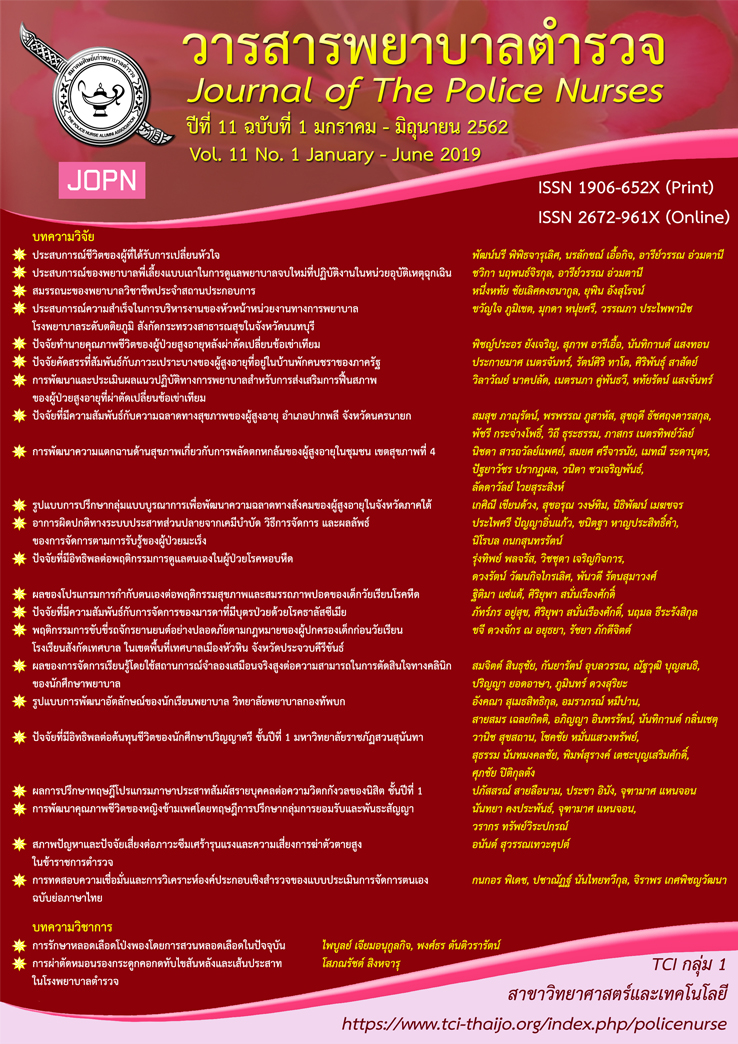LIVED EXPERIENCES OF PERSONS WITH HEART TRANSPLATATION
Keywords:
heart transplantation, adult nursing, qualitative research, phenomenologyAbstract
The research study was to describe the life experiences of heart transplant recipients and what transplantation has meant to them. Husserl’s phenomenology was applied using as the research methodology for this study. Informants were 12 adult patients who had undergone at least 1 year of heart transplantation. The data were collected by using in-depth interviews and audio-recording. Then, the data were transcribed word-for-word and analyzed using Colaizzi’s content analysis.
The results were divided into 2 parts as follows: 1) During a recovery period at home, patients needed to take care themselves by caring for surgical wound properly, keeping rehabilitation to walk normally, relieving drug side effects, and receiving assistance from family members. 2) Patients needed maintaining a new heart for lasting by taking immunosuppressive drugs on time, eating freshly cooked, hot, or bland food, cleaning inside house without dust and smoke, protecting against dust, smoke and UV light when going out, and changing their lifestyles for avoiding recurrent sickness.
Downloads
References
Jindatanasan, P., Kuwawatatanasamrid, K., & Prapaipanich, W. (2013). Self-care behavior in patient after kidney transplantation. Ramathibodi Nursing Journal, 19(1), 87-101.
Jeng, C., Chu, F., & Tsao, L. (2002). Empowering: The experiences of exercise among heart transplantation patients in Taiwan. Journal of Advanced Nursing, 40(11), 560-566.
Kanpradub, K. (1996). Quality of life in patient after heart transplantation, King Chulalongkorn Memmorial Hospital (Thesis for Degree of Master of sciences). Department of Adult nursing, Faculty of Nursing, Chulalongkorn University, Bangkok.
Kavanagh, T. (2005). Exercise rehabilitation in cardiac transplantation patients: A comprehensive review. European Journal of Physical and Rehabilitation Medicine, 41(3), 67-74.
Keller, B., Brathen, L. R., Marti, H. P., & Hunger, R. E. (2010). Skin cancers in renal transplant recipients: A description of the renal transplant cohort in Bern. Swiss Medical Weekly, 140(1), 130-140.
Kimpee. S., & Sinthu. S. (1999). Study way of life in patient after heart transplantation. Journal of nursing, 17(1), 76-80.
Koch, T. (1995). Interpretive approaches in nursing research: Influence of Husserl and Heidegger. Journal of Advanced Nursing, 21, 827-836.
Lincoin, Y. S., & Guba, E. G. (1985). Naturalistic inquiry. California, CA: Sage.
Oumtanee, A. (2010). Qualitative research in nursing (2nd ed.). Bangkok: Chulalongkorn university printing house.
Prommoon, S., & Teeracoop, P. (2001). 108 question for kidney transplantation. Journal of the kidney foundation of Thailand, 29(1), 66-86.
Ruzyczka, E. W., Milaniak, I., Przybyłowski, P., Wierzbicki, K., Siwinska, J., Hubner, F. K., & Sadowski, J. (2011). Depression and quality of life in terms of personal resources in heart transplant recipients. Transplantation proceedings, 43(8), 3076-3081.
Seriwichayasawas, N., & Sriprasan, P. (2014). The rules ofhome health care nurse in the university hospital. Nursing journal of the ministry of public health, 28(2), 92-108.
Shih, F. J., Tsao, C. I., Ko, W. J., Chou, N. K., Hsu, R. B., Chen, Y. S., ... & Chu, S. H. (2003). Changes in health-related quality of life and working competence before and after heart transplantation: One-year follow-up in Taiwan. Transplantation proceedings, 35(1), 466-471.
Streubert, H. J., & Carpenter, D. R. (2007). Qualitative research in nursing: Advancing the humanistic imperative. Philadelphia, PA: J. B. Lippicott.
The Thai Red Cross Organ donate. (2012). Annual report 2012. Retrieved from https://www.organdonate. in.th/wp-content/uploads/2013/04/odc2555.pdf
White-Williams, C., & Grady, K. (2008). Care of Patients undergoing Cardiac Transplantation. In D. Moser, & B. Riegel (Eds.), Cardiac nursing: A companion to Braunwald's heart disease (pp. 998-1021). Philadelphia, PA: Elsevier.
Downloads
Published
How to Cite
Issue
Section
License
ผลงานที่ได้ตีพิมพ์แล้วจะเป็นลิขสิทธิ์ของวารสารพยาบาลตำรวจ















